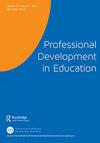Professional learning and development: sustainability in education
IF 3.1
3区 教育学
Q1 EDUCATION & EDUCATIONAL RESEARCH
引用次数: 0
Abstract
Sustainability is a frequently discussed topic across various conversations, including in our journal. It refers to the ability of individuals, organisations and society to coexist over an extended period without negative repercussions, whether environmental, economic or social. While sustainability has a long-standing history, its significance has become particularly prominent since 2015, when the United Nations established the Sustainable Development Goals (SDGs) as drivers for global development until 2030. These seventeen goals cover every aspect of our society. Unsurprisingly, education is one of the focal points of these goals and is recognised as a powerful means to alleviate poverty, achieve justice and restore a balanced relationship with the natural world. At my university, sustainability has been incorporated on campus through various means, such as restoration facilities, heating systems and the use of sustainable materials for renovations. Furthermore, sustainability is set to extend beyond the physical infrastructure of our university, as it is among the top priorities for redesigning both undergraduate and postgraduate curricula in the years ahead. With sustainability knocking on the doors of our schools and universities, metaphorically speaking, there is momentum to reflect on how this may affect the field of teachers’ professional development. After all, sustainability is not restricted to the education of our pupils and students; it applies to all levels of education, including lifelong learning. And if education is recognised as a potent driver for change, teachers’ professional learning and development will become a fundamental pillar for achieving the desired transformation towards a more sustainable society (Hays and Reinders 2020). Without claiming to be exhaustive, I would like to share some thoughts on this topic that touch upon various aspects of sustainability.专业学习与发展:教育的可持续性
本文章由计算机程序翻译,如有差异,请以英文原文为准。
求助全文
约1分钟内获得全文
求助全文
来源期刊

Professional Development in Education
EDUCATION & EDUCATIONAL RESEARCH-
CiteScore
6.30
自引率
4.80%
发文量
27
 求助内容:
求助内容: 应助结果提醒方式:
应助结果提醒方式:


